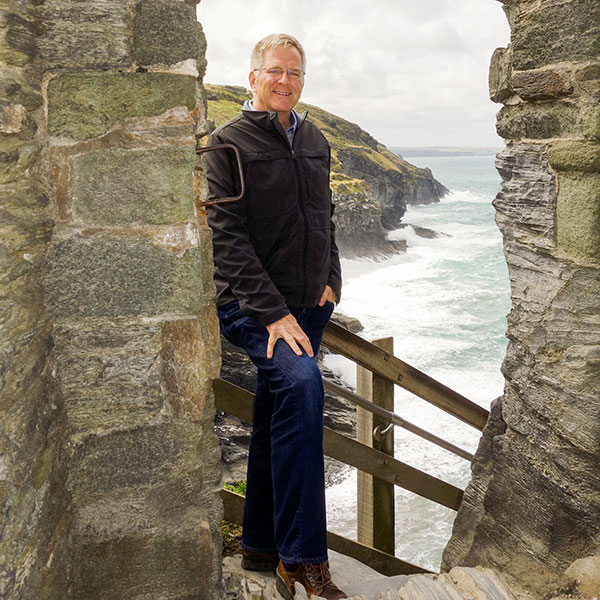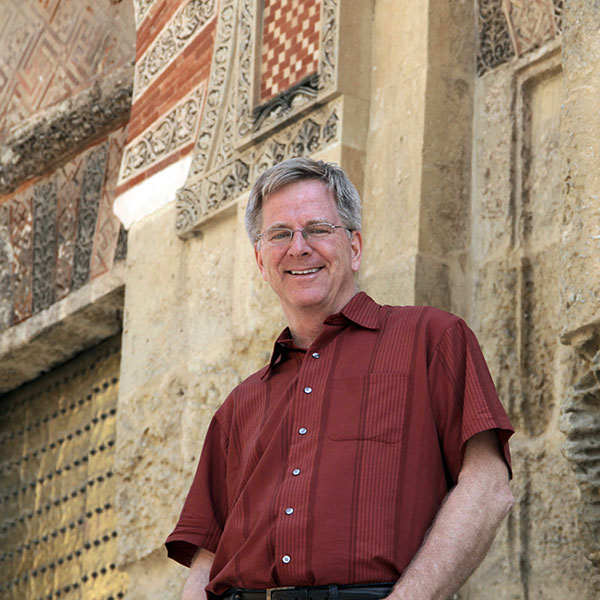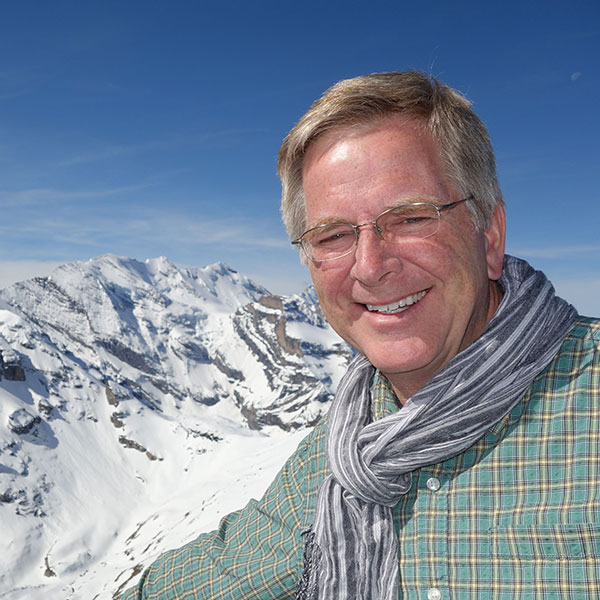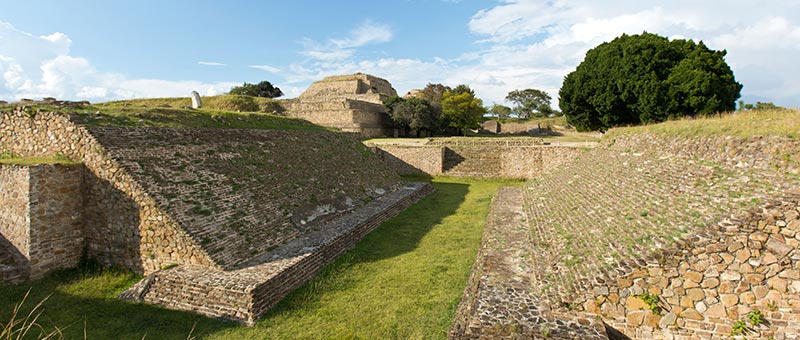LUTHERAN HIGHER EDUCATION
Inquiry
Instead of “Bon voyage,” travelers today are more likely to hear “Have a safe trip.”
That’s according to Rick Steves, author of best-selling travel books, including “Travel as a Political Act: How to Leave Your Baggage Behind.” The book, updated last year, is now in its third edition.
Steves lives in Edmonds, Washington and travels the world as a television personality, public radio host, author, and activist. He travels for a good portion of the year, so if people aren’t saying “Bon voyage” any more, he’d notice.
“The whole idea about traveling is to get out of your comfort zone, and to gain an empathy for the other 96 percent of humanity,” said Steves, who has been teaching people about travel for more than 30 years. “Roosevelt said, ’We have nothing to fear, but fear itself,’ and right now, we are too fearful. And I think it’s bad. Bad for the fabric of democracy.”
Steves has written and spoken about his Lutheran faith, and how it informs his world view. In 2016, he released a one-hour special focused on Martin Luther and the Reformation that took him to Reformation-related sites throughout Europe, including Wittenberg, Germany, where Luther famously developed his 95 Theses that sparked the Protestant Reformation.
“Just like travel can be a political act, travel can be a spiritual act,” Steves said. “When I travel, I like to travel alone. Because I’m never really alone. I’ve got a friend in Jesus, so he’s always with me.”
Getting to know the world — both places faraway and in a student’s own backyard — is at the heart of a well-rounded Lutheran higher education. That’s why Pacific Lutheran University offers study away programs to students through its Wang Center for Global Education. The center’s mission: “educating to achieve a just, healthy, sustainable and peaceful world, both locally and globally.”
Global education dovetails with PLU’s mission — nurturing academic freedom, inspiring critical thinking, and encouraging students to help others and the world.
Travel is eye-opening, Steves said. It makes the world smaller, and helps students learn about others and themselves. Students are challenged to question the world around them and ask “What does this mean?”
PLU Global Education programs are not a vacation. Their mission-driven nature, along with a service component, makes them so much more.
“There still is a perception in our community that when students go abroad, that all they are doing is taking a trip, and that there isn’t an academic basis to the experience,” said Tamara Williams, executive director of Wang Center. “That’s why the word ’trip’ is on the center’s banned list.”
Williams said Global Education at PLU is designed to acquaint students with major world issues. The goal is to give them the tools – disciplinary knowledge, experiential knowledge, and access to regions of the world – to prepare them to work and live and learn in a global context. Each program, between 25 and 40 of them per year, undergoes a rigorous review and approval process by the faculty.
“The whole idea about traveling is to get out of your comfort zone, and to gain an empathy for the other 96 percent of humanity.”
Steves, a University of Washington graduate, said that for many, college is the first opportunity to travel outside the country. He believes it’s important to a well-rounded college education and he applauds PLU’s efforts to make that possible.
“It opens the door to them that wouldn’t be open otherwise,” Steves said. “It’s like all of a sudden you went from black-and-white to a color TV. Or you’ve been going to a library all your life and somebody says, ’Oh, there’s a second floor.’”
For PLU, the study away programs have become a mark of distinction. At graduation, more than 50 percent of students will have studied away. About two-thirds travel during J-term. About a third of undergraduates choose a semester-long program, and that option is becoming more popular.
The experiences take students all over the world. Gateway Study away programs to Mexico, Namibia, Trinidad and Tobago, Norway, England and China are offered annually.
Mexico is a consistently popular destination. Williams notes that both PLU’s Hispanic Studies program and current issues could be fueling that trend.
Interest in peace and conflict studies in Oslo, Norway, is also on an upswing. One of the highlights of that program: students get press passes to a briefing for the Nobel Peace Prize ceremony.
Steves says politics and global issues have changed how he approaches his travel career.
“Gradually my teaching focus has slid up a kind of Maslow’s Hierarchy of Travel Needs,” he said.
In the ’80s, Steves focused on sharing basic budget travel tips. In the ’90s, it was all about traveling to enjoy the culture, cuisine, history, and art.
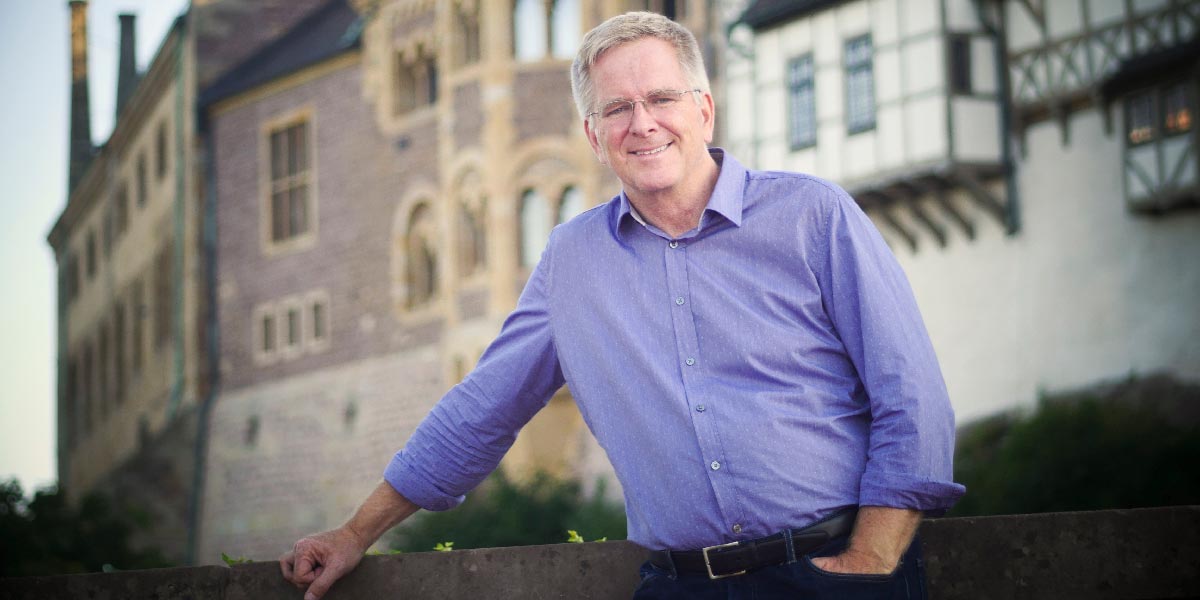
Rick Steves in Germany at the Wartburg Castle.
“Then since 9-11, I realized Americans need to be challenged to better understand the world,” he said. “ Because we tend to be frightened, and ethnocentric, and easily threatened. And the world is a beautiful place.”
Steves talks about current politics and the fear of refugees.
“There is so much anxiety in our country and people are more afraid than ever,” he said. “I feel like somebody’s got to stand up and say, ’America, get a grip.’”
Steves believes travel today is safer than ever. “What’s dangerous is watching too much fear-mongering commercial TV news,” he added.
Steves was 14 when his father, who was in the piano business, came home and told his family they were going to Germany to look at pianos, and then off to Norway to visit relatives. At first, teenage Steves was less than thrilled. But upon arrival, his attitude changed.
“It was my first trip and there was different candy, and pop, and statuesque German women with hairy armpits and I thought, ’This world is a wonderland,’” he remembered. “Then I got to watch the Apollo moon landing in Norway. To me that was really fascinating. I realized it was a human triumph, not just an American one. It opened me up a little bit. Something I wouldn’t have recognized if I stayed home.”
Steves recalls a park in Oslo.
“I saw all these other parents loving their kids as much as my parents loved me,” he said. “It occurred to me that this world is home to billions of equally precious children of God.
“Then since 9-11, I realized Americans need to be challenged to better understand the world.”
“And then I met a man who said he, l witnessed the assassination of Archduke Franz Ferdinand in Sarajevo (in 1914) and I realized, ’Wow, history is a living thing!’”
Travel had the power to inspire a teenage Steves, setting him on a serendipitous career path. His company, Back Door Productions, employs 100 people. He also had the opportunity to raise his now grown-children with an unparalleled world perspective.
He hopes PLU students take advantage of Global Studies opportunities — for their sake, and everyone else’s.
“When I was younger globalization wasn’t that big of a deal, but now it is. It’s a globalized world,” Steves said. “And the United States can convince itself that everything revolves around us, but that’s just because we’re the most ethnocentric people around. And when you get out of your country you learn more by looking at it from a distance.”
In contrast, when Steves is home, he’s really home.
His office window overlooks his old junior high school.
“Just like travel can be a political act, travel can be a spiritual act,” Steves said. “You get out and you realize the world is full of beautiful people, and that we’re all children of God. If we are all children of God, we are all — in a sense — family.”


